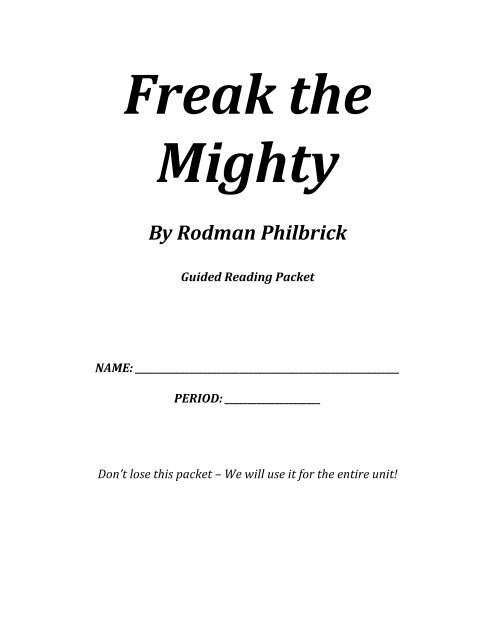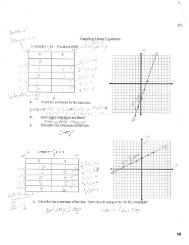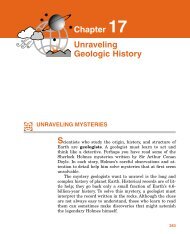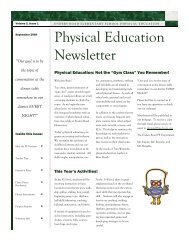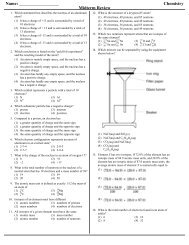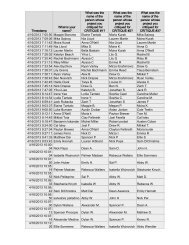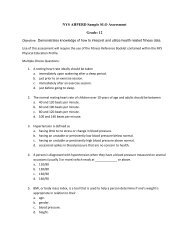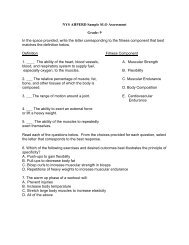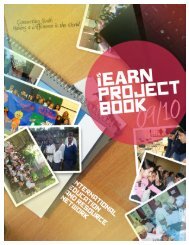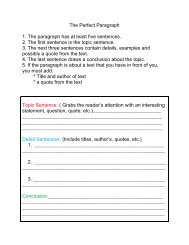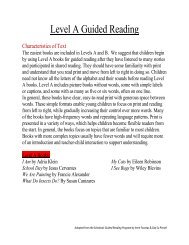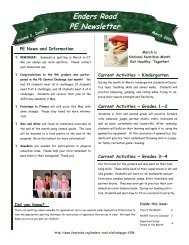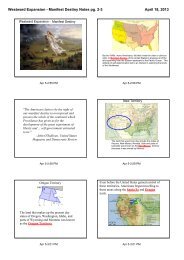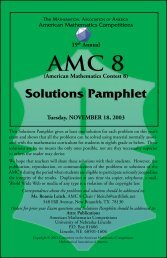By Rodman Philbrick
By Rodman Philbrick
By Rodman Philbrick
You also want an ePaper? Increase the reach of your titles
YUMPU automatically turns print PDFs into web optimized ePapers that Google loves.
Freak the<br />
Mighty<br />
<strong>By</strong> <strong>Rodman</strong> <strong>Philbrick</strong><br />
Guided Reading Packet<br />
NAME: __________________________________________________________<br />
PERIOD: _____________________<br />
Don’t lose this packet – We will use it for the entire unit!
Directions for reading the book and completing this<br />
packet:<br />
• We will be using this packet as a guide for active<br />
reading as we read <strong>Rodman</strong> <strong>Philbrick</strong>’s novel, Freak<br />
the Mighty.<br />
• As we read in class and as you continue reading at<br />
home, please record your notes on the graphic<br />
organizer pages, in the space provided for the<br />
corresponding chapter.<br />
• There will be a quiz at the end of the unit, on Friday,<br />
May 18 th , so be sure to read carefully and take good<br />
notes as you do so.<br />
• The activities that are included in the packet (aside<br />
from the note-‐taking pages) will be completed in class.
Name ________________________________________ _ Period ___ __<br />
Pre-Reading Preparation<br />
Author Biography: <strong>Rodman</strong> <strong>Philbrick</strong><br />
© -<br />
- Freak the Mighty<br />
<strong>Rodman</strong> <strong>Philbrick</strong> was born o n January 22,<br />
1951 in Boston, Massachusetts, the first of<br />
four boys. He was raised in Rye Beach,<br />
New Hampshire and at tended Rye Schools.<br />
He began to write for his ow n pleasure in<br />
sixth grade, but felt that writing was “n ot<br />
cool” like being good at sports or be ing in<br />
the in-crowd so he kept it to himself.<br />
At the age of sixteen, <strong>Philbrick</strong> completed<br />
his first novel, a bo ok-length series of<br />
stories about two characters, similar to<br />
Freak the Mighty. The book was never<br />
published. He grad uated from Portsmouth<br />
High school in 1969, and went on to attend<br />
University of New Hampshire. He dropped<br />
out in his soph omore year, began working<br />
at various jobs as a carpenter,<br />
longshoreman, and boat builder, and even<br />
started a couple of businesses that were<br />
unsuccessful. He never gave u p on his true<br />
passion, however, and continued writing in his spare time.<br />
Eleven years after that first a ttempt, he was st ill unpublished. De termined to become a<br />
writer, he decided to write a g enre novel, as sugg ested by one of the publishers he had<br />
contacted. In a relatively short time, he was writing and publishing mysteries, detective<br />
stories, thrillers—whatever he could sell. After a couple of years he was able to give up his<br />
part-time jobs and settle into writing for a l iving. He le arned a lot about writing while<br />
working on the genre novels and actually liked it. Finally, he was making a living doing<br />
something he enjoyed.<br />
Before long he decided that he should try writing for kids. It was a break from the safety<br />
of writing genre novels, but h e had to do it, even though he felt it had no commercial<br />
possibilities. He just couldn’t let the story go; the inspiration to write Freak the Mighty was<br />
too strong. He foun d that it wasn’t work to him; it was fun! The most important novel in<br />
his career was finished in just six weeks.<br />
While continuing to write and publish adult thrillers under pen names William R. Dantz, W.R.<br />
<strong>Philbrick</strong>, and Chris Jordan, he went on to write many books for teens, with Freak the<br />
Mighty (1993), The Fire Pony (1996), Max the Mighty (1998), Last Book in the Universe<br />
(2000), REM World (2000), The Journal of Douglas Allen Deeds (2002), The Young Man and<br />
the Sea (2003), Lobster Boy (2005), and The Mighty (1998, a reissue of Freak the Mighty)<br />
among them. He has also written several other books with his wife, Lynn Harnett. Freak<br />
the Mighty won many honors, including the Judy Lopez Honor Book '93, ALA Best Books for<br />
Young Adults, ALA Recommended Books for Reluctant Readers, California Young Readers<br />
Medal Winner, and Arizona Young Readers Medal Winner.<br />
<strong>Philbrick</strong> lives with his wife Lynn, whom he married in 1980, and they divide their time<br />
between homes in Maine and the Florida Keys.
Name ________________________________________ _ Period ___<br />
Standards Focus: Exploring Expository Writing<br />
Directions: Using the biographical information about <strong>Rodman</strong> <strong>Philbrick</strong> on page 6, answer<br />
the following questions. Write the letter of the correct answer on the line.<br />
1. ________ What is the author’s purpose in writing this biography of <strong>Rodman</strong> <strong>Philbrick</strong>?<br />
a. To persuade the reader to read <strong>Philbrick</strong>’s books<br />
b. To describe <strong>Philbrick</strong>’s life experiences<br />
c. To inform the reader about <strong>Philbrick</strong>’s life and works<br />
d. To entertain the reader before reading <strong>Philbrick</strong>’s novel<br />
2. ________ Based on the information given in paragraph 2, the reader can assume that:<br />
a. <strong>Philbrick</strong> wrote Freak the Mighty when he was sixteen<br />
b. <strong>Philbrick</strong> never graduated from college<br />
c. <strong>Philbrick</strong> really enjoyed writing<br />
d. <strong>Philbrick</strong> was more suited to physical labor than to writing<br />
3. ________ <strong>Philbrick</strong> wrote the genre novels because through them he knew he could<br />
make a living. Why didn’t he just continue writing them exclusively?<br />
a. It was boring writing the same type of story over and over<br />
b. He felt he had a more important story to tell<br />
c. He ran out of ideas for mysteries<br />
d. Children were begging for more of his novels<br />
4. ________ Where would be the best place in the biography to insert information about<br />
<strong>Philbrick</strong>’s childhood?<br />
a. In paragraph one<br />
b. Between paragraphs one and two<br />
c. Before paragraph one<br />
d. After paragraph two<br />
Directions: Answer the following questions using complete sentences.<br />
5. The term genre novel is used in this biography. Using context clues from the<br />
information given, what do you believe is the meaning of the term?<br />
6. If you were given the opportunity to interview <strong>Rodman</strong> <strong>Philbrick</strong> for an article to be<br />
published in your school newspaper, what three or four questions would you ask him?<br />
© -<br />
- Freak the Mighty
Name ________________________________________ _ Period ___ __<br />
Freak the Mighty<br />
Anticipation/Reaction Guide—Before Reading<br />
Directions: For each of the following statements, compose one well-written sentence giving<br />
your reaction to the statement in your response. An example has been done for you. (Be<br />
prepared to read some of your responses aloud in class.)<br />
Ex. Everyone in every situation should always be treated equally.<br />
Sometimes people have different needs and treating everyone the same in every situation<br />
might even be unfair under certain circumstances.<br />
1. It is always best to speak the truth, no matter what the consequences.<br />
2. A true friend is a friend for life—one who will always agree with everything you do and<br />
back you up in any situation.<br />
3. Virtually everybody agrees that bullying is a bad thing, and for that reason it can be<br />
concluded that most people who bully others really don’t realize that they are doing it.<br />
4. People are most comfortable spending time with others who are just like themselves.<br />
5. Children who are raised by their natural parents have an unquestionably easier life than<br />
those who are raised by someone who is not their natural parent.<br />
6. Only smart people or those who work very hard will become truly successful in life.<br />
© -<br />
- Freak the Mighty
Name ________________________________________ _ Period ___ __<br />
Freak the Mighty<br />
Anticipation/Reaction Guide Reflection<br />
Pre-Reading Individual Reflection<br />
Directions: After several students have shared their responses with the entire class,<br />
get into small groups and discuss your answers as well as your group members’<br />
answers. Listen carefully to their responses, paying attention to their individual<br />
opinions. After you have discussed your “Before Reading” responses, answer the<br />
following questions below or on a separate piece of paper. Be sure to write in<br />
complete sentences and number your answers.<br />
© -<br />
1. Which statement triggered the most thought-provoking or interesting<br />
discussion among your group members? Summarize the discussion/debate.<br />
2. For any statements that you discussed, what were some of the strongest or<br />
most important points made by your group members? How did those<br />
statements affect your opinion?<br />
3. When you found that a member of your group disagreed with the way you<br />
feel about an issue, what was your reaction?<br />
4. Why do you think there might be so many differing opinions about the<br />
answers to even the simplest questions?<br />
- Freak the Mighty
Name ________________________________________ _ Period ___ __<br />
Note-taking for chapters 1-5<br />
For some students, reading can be a difficult, tedious task. Part of the problem is that many<br />
students do not have the tools they need to read for meaning, and lose interest because they cannot<br />
follow the action, do not understand, or cannot relate to the events or the characters.<br />
Below is a chart that you will be completing as you read Freak the Mighty. It is designed to help you<br />
understand the action, conflict, and characters and to eventually appreciate the author’s reasons for<br />
writing the book.<br />
Directions: For Chapters 1-5, use the chart below to help you keep track of your reading.<br />
Summarize the setting or settings, and then summarize each major event in the chapter. Try to<br />
keep your summaries short—just a few words or phrases. Do not write in complete sentences!<br />
Chapter 1 has been done as an example for you.<br />
Chapter<br />
1<br />
Chapter<br />
2<br />
Chapter<br />
3<br />
Chapter<br />
4<br />
Chapter<br />
5<br />
Setting<br />
No real setting given;<br />
he just flashes back to<br />
telling how he met<br />
Freak in daycare, but<br />
doesn’t describe the<br />
scene.<br />
Action Summary (Plot) and<br />
Characters Involved<br />
Max flashes back to meeting Kevin in<br />
daycare. Sees him again in a special bus<br />
when he is in about 3 rd grade, then he<br />
moves into a duplex down the street the<br />
summer before 8 th grade.<br />
Important to Remember<br />
From This Chapter<br />
Max had a temper—nicknamed<br />
Kicker; Kevin (Freak) had leg<br />
braces even then. Max is really<br />
growing and Grim and Gram<br />
notice that he is beginning to<br />
look a lot like his father.<br />
Now that you have read and taken notes on Chapters 1-5, make a prediction (educated<br />
guess) about what you believe will happen next in the novel.<br />
My Prediction:<br />
_________________________________________________________________________<br />
_________________________________________________________________________<br />
_____________________________________________ _<br />
- 5 - Freak the Mighty
Name ________________________________________ _ Period ___ __<br />
Standards Focus: Figurative Language in chapters 1-5<br />
One of the most captivating aspects of good literature is the use of figurative language, or<br />
ideas communicated beyond their literal meaning to create an image in the reader’s or<br />
audience’s mind. There are several types of figurative language, also called figures of speech.<br />
In this exercise, you will use the following figures of speech:<br />
• metaphor- a comparison made between two unlike objects: “The pillow was a cloud.”<br />
• simile- a comparison made between two unlike objects, using the words “like” or “as” in<br />
the comparison: “The pillow was like a marshmallow.”<br />
• personification- giving human qualities or characteristics to non-human objects: “The<br />
wind sang its sad song.”<br />
• hyperbole- truth is exaggerated for humor or emphasis: “I died when the boy I like<br />
finally talked to me.”<br />
Directions: Read each quote from Chapters One through Five. Look at the underlined<br />
figure of speech in the sentence, then decide what type of figure of speech it is. Finally<br />
identify the comparison being made or the object being personified or exaggerated. An<br />
example has been done for you.<br />
Ex. “I never had a brain until Freak came along and let me borrow his for a while, and that’s<br />
the truth, the whole truth.” (pg. 1)<br />
Figure of Speech: hyperbole (or metaphor)<br />
Analysis: Max wasn’t very smart until Freak came along and taught him how to learn.<br />
1. “Except I had a way of saying things with my fists and my feet even before we became<br />
Freak the Mighty...” (1)<br />
Figure of Speech:<br />
Analysis:<br />
2. “And Gram right away shushes him and says don’t ever say that, because little pictures<br />
have big ears, which makes me run to the mirror to see if it is my big ears made me look<br />
like Him.” (4)<br />
Figure of Speech:<br />
Analysis:<br />
3. “…he’s exploding out of his shoes.” (4)<br />
Figure of Speech:<br />
Analysis:<br />
4. “I’m just this critter hiding out in the basement, drooling in my comic books or<br />
whatever.” (6)<br />
Figure of Speech:<br />
Analysis:<br />
5. “At first she’s a glimpse, caught her going between the van and the front door, talking to<br />
the beards.” (7)<br />
Figure of Speech:<br />
Analysis:<br />
- 6 - Freak the Mighty
Name ________________________________________ _ Period ___ __<br />
6. “…she has this glow, a secret spotlight that follows her around and makes her eyes light<br />
up.” (7)<br />
Figure of Speech:<br />
Analysis:<br />
Directions: Now identify and underline the figure(s) of speech in the sentence, then decide<br />
what type of figure of speech it is. Finally identify the comparison being made or the<br />
object being personified or exaggerated.<br />
7. “…my feet are going wild that year and I keep tripping over everything. Cracks in the<br />
sidewalk, ants on the sidewalk, shadows, anything.” (8)<br />
Figure of Speech:<br />
Analysis:<br />
8. “If you didn’t know, you would think he was like a kindergarten creeper who forgot how<br />
to walk, he’s that small.” (11)<br />
Figure of Speech:<br />
Analysis:<br />
9. “I am amazed, because it does fly just like a little bird, flitting up and down and around,<br />
higher than I can reach.” (13)<br />
Figure of Speech:<br />
Analysis:<br />
10. “It’s cool and dim in there and you float like a cloud – no, you are a cloud…” (21)<br />
Figures of Speech: 1. ; 2.<br />
Analysis:<br />
Now, find two other examples of figures of speech from Chapters One through Five and<br />
write them on the lines. Identify the type of figure of speech and write an analysis.<br />
11.<br />
12.<br />
Figure of Speech:<br />
Analysis:<br />
Figure of Speech:<br />
Analysis:<br />
- 7 - Freak the Mighty
Name ________________________________________ _ Period ___ __<br />
Note-taking for chapters 6-10<br />
Directions: For Chapters 6-10, use the chart below to help you keep track of your reading.<br />
Summarize the setting or settings, and then summarize each major event in the chapter. Try to<br />
keep your summaries short—just a few words or phrases. Do not write in complete sentences!<br />
Chapter<br />
6<br />
Chapter<br />
7<br />
Chapter<br />
8<br />
Chapter<br />
9<br />
Chapter<br />
10<br />
Setting<br />
Action Summary (Plot) and<br />
Characters Involved<br />
Important to Remember<br />
From This Chapter<br />
Now that you have read and taken notes on Chapters 6-10, make a prediction about what<br />
you believe will happen next in the novel.<br />
My Prediction:<br />
_________________________________________________________________________<br />
_________________________________________________________________________<br />
_________________________________________________________________________<br />
- 8 - Freak the Mighty
Name ________________________________________ _ Period ___ __<br />
Standards Focus: Character Development in chapters 1-10<br />
The characters in a novel or play may be revealed to the reader or audience in a variety of ways.<br />
Your main impression of a character is formed through his/her speech or actions, physical<br />
description, mannerisms, surroundings, other characters’ reactions to that character, or the writer’s<br />
feelings about the character. A static character is one who changes very little or not at all<br />
throughout the story. A dynamic character is one who changes or grows significantly as the<br />
story unfolds.<br />
Max and Kevin, the two most important characters in Freak the Mighty, can both be described as<br />
dynamic characters. Each of them goes through major changes that are revealed through their<br />
dialogue and actions, and by what the author says about them. Other characters’ reactions to them<br />
also change throughout the story. These other characters could be static or dynamic characters.<br />
Directions: Locate specific quotes or descriptions of the characters below to show examples of their<br />
behavior or personalities from Chapters 1-10, using the clues above the box. Then find examples<br />
that show some of the changes they have undergone in the story so far, if they have changed at all.<br />
If the character has not changed, write “static character” in the box.<br />
What he says about himself<br />
1. Jack<br />
What someone else says about him<br />
Example of his actions<br />
2. Jack<br />
Example showing how he has changed<br />
3. Jack<br />
What he says about himself<br />
What someone else says about him<br />
Kevin<br />
Max<br />
- 9 - Freak the Mighty
Name ________________________________________ _ Period ___ __<br />
Example of his actions<br />
(Max)<br />
4. Jack<br />
Example showing how he has changed<br />
5. Jack<br />
What she says about herself<br />
What someone else says about him<br />
What someone else says about her<br />
Example of her actions<br />
Example showing how she has changed<br />
What she says about herself<br />
What someone else says about her<br />
Example of her actions<br />
Example showing how she has changed<br />
Gwen<br />
Gram<br />
- 10 - Freak the Mighty
Name ________________________________________ _ Period ___ __<br />
Note-taking for chapters 11-15<br />
Directions: For Chapters 11-15, use the chart below to help you keep track of your reading.<br />
Summarize the setting or settings, and then summarize each major event in the chapter. Try to<br />
keep your summaries short—just a few words or phrases. Do not write in complete sentences!<br />
Chapter<br />
11<br />
Chapter<br />
12<br />
Chapter<br />
13<br />
Chapter<br />
14<br />
Chapter<br />
15<br />
Setting<br />
Action Summary (Plot) and<br />
Characters Involved<br />
Important to Remember<br />
From This Chapter<br />
Now that you have read and taken notes on Chapters 11-15, make a prediction about what<br />
you believe will happen next in the novel.<br />
My Prediction:<br />
_________________________________________________________________________<br />
_________________________________________________________________________<br />
_________________________________________________________________________<br />
- 11 - Freak the Mighty
Name ________________________________________ _ Period ___ __<br />
Scavenger hunt: Setting and Mood<br />
One of the most important aspects of a novel is its setting. Setting includes:<br />
• Physical description: geography, weather, description of surroundings, etc.<br />
• Time: historical time period, season, time of day, etc.<br />
• Atmosphere: social, cultural, and political conditions<br />
Mood is the atmosphere or emotional state created by a piece of literature. Mood is usually<br />
described in expressions of feeling and emotions, such as fear, anger, hatred, contentment,<br />
loneliness, confusion, happiness, excitement, or jealousy, to name a few.<br />
In Freak the Mighty, even though most of the action takes place within Max’s bedroom, his<br />
yard, the school, and the hospital, other elements contribute a lot to the setting. Setting<br />
contributes a great deal to creating the mood of the novel.<br />
Directions: For each section, find specific examples from Chapters 11-15 that describe the<br />
setting. (You may go back and find examples from Chapters 1-15 if you prefer.) Then, tell<br />
how the setting affects the mood. An example has been done for you.<br />
Physical Description: Geography,<br />
Weather, etc.<br />
Time: Time Period, Season,<br />
Time of Year, Day, etc.<br />
Atmosphere: Social, Cultural,<br />
and Political Climate<br />
Tenements are falling apart; looks sad and<br />
smells like fish and sour milk; bikes and toys<br />
lying around, broken; kids are almost as<br />
busted up as the toys.<br />
How Does the Setting Affect the Mood?<br />
This place makes me feel depressed and<br />
sad, makes me feel sorry for people who<br />
live there. I feel fearful of the tenements,<br />
and imagine the people there are lonely.<br />
- 12 - Freak the Mighty
Name ________________________________________ _ Period ___ __<br />
Note-taking for chapters 16-20<br />
Directions: For Chapters 16-20, use the chart below to help you keep track of your reading.<br />
Summarize the setting or settings, and then summarize each major event in the chapter. Try to<br />
keep your summaries short—just a few words or phrases. Do not write in complete sentences!<br />
Chapter<br />
16<br />
Chapter<br />
17<br />
Chapter<br />
18<br />
Chapter<br />
19<br />
Chapter<br />
20<br />
Setting<br />
Action Summary (Plot) and<br />
Characters Involved<br />
Important to Remember<br />
From This Chapter<br />
Now that you have read and taken notes on Chapters 16-20, make a prediction about what<br />
you believe will happen next in the novel.<br />
My Prediction:<br />
_________________________________________________________________________<br />
_________________________________________________________________________<br />
_________________________________________________________________________<br />
- 13 - Freak the Mighty
Name ________________________________________ _ Period ___ __<br />
Life Skills—Improving Your Character<br />
We have all been in situations where we have not behaved toward someone as we should<br />
have, or perhaps you may have been the victim of such treatment. Sometimes we behave<br />
this way because our friends are doing it, or possibly because it makes us feel somehow<br />
superior. But often, it is because we don’t know how to react to the person’s personality,<br />
disability, or differences. In this activity, you will be practicing some techniques to help you<br />
better understand how someone might feel if they were mistreated, and you will discover<br />
some techniques for dealing with the “bully” type.<br />
Directions: Read each quote, then write a positive reaction that could be used to deal with<br />
the teasing. Try to use your sense of humor, which is one of the best ways to throw a<br />
bully off guard. If joking won’t work in a particular situation, think of something you could<br />
say to help the bully feel compassion and concern for their victims, instead of picking<br />
on others. (You may be called on to demonstrate your answers in front of the class.)<br />
(P. 7) “Hey you, Doofus! Yeah, you with the hairy face, take it easy with that box. That<br />
box contains a computer, you know what a computer is?”<br />
(P. 29) “Hey, you! Mutt and Jeff! Frankenstein and Igor! Don’t look around, I’m talkin’ to<br />
you, boneheads. What is this, a freak show?”<br />
(P. 76) “Forget it, Mrs. Donelli, his brain is in his tail! Ask him to count, he can paw the<br />
ground!”<br />
(P. 81) “As you know, heh heh, my personal opinion has always been that you’re lazy and<br />
stubborn and you didn’t want to learn.”<br />
(P. 109) “Now your grandparents say you’re nothing but a dysfunctional retard, but no kin<br />
of mine is a retard, and that’s a fact. So first thing, you’ve got to start acting smart. Use<br />
your head. We’ve got a situation going here, boy, so the way to handle it, you just do<br />
exactly what I say, no matter what. Understood?”<br />
(P. 121) “You can’t trust a cripple, but I guess you know that now, don’t you?”<br />
- 14 - Freak the Mighty
Name ________________________________________ _ Period ___ __<br />
Standards Focus: Elements of Style<br />
An author’s style is what makes his/her writing unique. Word choice, figurative language, imagery,<br />
rhythm, sentence structure, foreshadowing, symbolism, use of dialect, and other literary devices all<br />
work together to make an author’s writing distinctive. The style an author uses when he/she writes<br />
influences how well we understand and identify with the literature.<br />
<strong>Rodman</strong> <strong>Philbrick</strong> uses numerous techniques to create a style that makes Freak the Mighty a literary<br />
success. He uses imagery, hyperbole, even run-on and incomplete sentences extensively. He also<br />
uses some difficult vocabulary, long wordy sentences, and a bit of dialect.<br />
Directions: Identify the elements of style that are being used in each of the following excerpts,<br />
choosing from the box below. Elements may be used more than once, and there may be more than<br />
one right answer for each. Once you have identified the elements of style that have been used,<br />
explain the effect that these techniques have on the reader. An example has been done for you.<br />
Ex. “I never had a brain until Freak came along and let me borrow his for a while, and that’s the<br />
truth, the whole truth. The unvanquished truth, is how Freak would say it, and for a long time it was<br />
him who did the talking. Except I had a way of saying things with my fists and my feet even before<br />
we became Freak the Mighty, slaying dragons and fools and walking high above the world.” (1)<br />
Elements of style: long wordy sentences, sensory images, heightened vocabulary<br />
Effect: This passage uses sensory images (sight) to create for the reader a mental picture of the two<br />
of them walking somewhere up high, like up in the clouds. The sentences he writes are long and<br />
wordy, like run-ons, but they sound like a kid is writing, so I get the feeling it is really written by a<br />
kid. The vocabulary (unvanquished) makes me wonder what’s to come.<br />
1. “Gram and Grim, bless their pointed little heads, they’re my mother’s people, her parents, and<br />
they figured whoa! better put this little critter with other little critters his own age, maybe it will<br />
improve his temper.” (1)<br />
Elements of style:<br />
Effect:<br />
2. “So, finally I get bored in the down under and I’m hanging out in the so-called back yard, your<br />
basic chunk of chain link heaven. Grim keeps this crummy little mower in the shed, but what’s the<br />
point of mowing dirt, right?” (6)<br />
Elements of style:<br />
Effect:<br />
short or incomplete sentences clear rhythm pattern dialect<br />
heightened vocabulary sense of humor figurative language<br />
long, wordy sentences repetition sensory images<br />
3. “<strong>By</strong> this time I’m hunkering along in front of the place, trying to maintain a casual attitude,<br />
except like I said my feet are going wild that year and I keep tripping over everything. Cracks in the<br />
sidewalk, ants on the sidewalk, shadows, anything.” (8)<br />
- 15 - Freak the Mighty
Name ________________________________________ _ Period ___ __<br />
Elements of style:<br />
Effect:<br />
4. “All mechanical objects require periodic maintenance. We’ll schedule installation of a new<br />
propulsion unit as soon as the Fair Gwen of Air gets a replacement.” (13)<br />
Elements of style:<br />
Effect:<br />
5. “‘Gram must be your grandmother,’ he says. ‘Grim would be, I suppose, a sobriquet for your<br />
grandfather, based on his demeanor.’ ‘I go, huh?’ Freak grins and pushes back his yellow hair, and<br />
he goes, ‘Pardon my vocabulary. Sobriquet means ‘nickname,’ and demeanor means ‘expression.’ I<br />
merely postulated that you call your grandfather ‘Grim’ because he’s grim. Postulate means —’” (15)<br />
Elements of style:<br />
Effect:<br />
6. “There’s a place I go inside my head sometimes. It’s cool and dim in there and you float like a<br />
cloud—no you are a cloud, the kind you see in the sky on a windy day, the way they keep changing<br />
shape except you can’t really see it changing? It just sort of happens, and suddenly you realize the<br />
cloud that looks like a big hand with fat fingers now looks like a catcher’s mitt, or a big soft TV set?<br />
Like that.” (21)<br />
Elements of style:<br />
Effect:<br />
7. “Got any, dudes? ... Pay attention, I asked did you got any.” (30)<br />
Elements of style:<br />
Effect:<br />
8. “I hate the beach because the beach is stupid, the cool crowd looking sleek and tanned and<br />
aren’t-we-gorgeous?, and because if you saw me lying on a blanket you’d go, hey, why is that albino<br />
walrus wearing sunglasses?” (44)<br />
Elements of style:<br />
Effect:<br />
- 16 - Freak the Mighty
Name ________________________________________ _ Period ___ __<br />
Note-taking for chapters 21-25<br />
Directions: For Chapters 21-25, use the chart below to help you keep track of your reading.<br />
Summarize the setting or settings, and then summarize each major event in the chapter. Try to<br />
keep your summaries short—just a few words or phrases. Do not write in complete sentences!<br />
Chapter<br />
21<br />
Chapter<br />
22<br />
Chapter<br />
23<br />
Chapter<br />
24<br />
Chapter<br />
25<br />
Setting<br />
Action Summary (Plot) and<br />
Characters Involved<br />
Important to Remember<br />
From This Chapter<br />
Now that you have read and taken notes on Chapters 21-25, make a prediction about<br />
where you believe Max’s life will go from here.<br />
My Prediction:<br />
_________________________________________________________________________<br />
_________________________________________________________________________<br />
_________________________________________________________________________<br />
- 17 - Freak the Mighty
Post-‐Reading Reaction<br />
Directions: Look back at your Anticipation Guide on page 3. Reread the responses<br />
you wrote before reading the novel, and then answer the following questions, either<br />
below or on a separate piece of paper. Compare your responses from “Before<br />
Reading” to what you feel now, after reading the novel. Answer each question using<br />
complete sentences.<br />
1. Which of your responses has changed since reading the novel?<br />
______________________________________________________________________________________________<br />
______________________________________________________________________________________________<br />
______________________________________________________________________________________________<br />
2. For those statements you feel differently about after reading the novel, describe<br />
your reaction now, comparing it to your original response.<br />
______________________________________________________________________________________________<br />
______________________________________________________________________________________________<br />
______________________________________________________________________________________________<br />
______________________________________________________________________________________________<br />
3. Describe a scene from the novel that had a powerful effect on you and made you<br />
change your way of thinking.<br />
______________________________________________________________________________________________<br />
______________________________________________________________________________________________<br />
______________________________________________________________________________________________<br />
______________________________________________________________________________________________<br />
4. In small groups, talk to some of your classmates about their responses. How are<br />
their responses different now that they have read the novel?<br />
______________________________________________________________________________________________<br />
______________________________________________________________________________________________<br />
______________________________________________________________________________________________<br />
______________________________________________________________________________________________<br />
-‐-‐ 18 -‐-‐
5. Overall, are the feelings of your other group members the same or different from<br />
yours? Do any of their responses surprise you? Which ones? How?<br />
______________________________________________________________________________________________<br />
______________________________________________________________________________________________<br />
______________________________________________________________________________________________<br />
______________________________________________________________________________________________<br />
______________________________________________________________________________________________<br />
______________________________________________________________________________________________<br />
6. Why do you think there might be so many different opinions and viewpoints?<br />
What do you feel has contributed to the way you and your classmates responded to<br />
each statement?<br />
______________________________________________________________________________________________<br />
______________________________________________________________________________________________<br />
______________________________________________________________________________________________<br />
______________________________________________________________________________________________<br />
______________________________________________________________________________________________<br />
______________________________________________________________________________________________<br />
-‐-‐ 19 -‐-‐
Name ________________________________________ _ Period ___ __<br />
Just For Fun! Freak the Mighty<br />
Final Quiz Review Crossword<br />
1 2<br />
5 6<br />
3 4<br />
7 8<br />
9 10 11<br />
12 13<br />
18 19<br />
14<br />
15 16 17<br />
20 21 22<br />
ACROSS<br />
29<br />
1 Kevin gave Max this in the hospital<br />
4 let the class get out of hand<br />
6 tried to untie Max, but was strangled<br />
9 real author of Freak the Mighty<br />
12 science of designing replacement parts for the<br />
human body<br />
13 Kenny Kane's friend who helped him hide out<br />
14 Max's grandfather who was raising him<br />
15 Kevin got one of these for his birthday<br />
16 Killer Kane<br />
20 Kevin and Max went to the sewer to find this<br />
21 remembering is just an ______ of the mind<br />
22 his best friend taught him a lot about words<br />
24 school principal<br />
25 what Kenny and Max did in the old lady's<br />
apartment<br />
27 abducted Max<br />
28 Kevin had one of these on his birthday<br />
29 invited Max to dinner at her house in apology<br />
27<br />
24 25<br />
26<br />
28<br />
DOWN<br />
2 where Kenny went after Max went back home<br />
3 told the police where to find Kenny and Max<br />
4 what Kevin's dad must have been<br />
5 wanted bionic surgery to get a new body<br />
7 Kevin gave Max this for Christmas<br />
8 The boys named themselves this<br />
10 name Max and Kevin called Loretta because she<br />
had her purse stolen<br />
11 Max's nickname in day care<br />
17 a nickname for the tenement houses<br />
18 treated Max like a son<br />
19 name Grim and Gram liked to call Max<br />
23 Kevin choked on this at school<br />
26 picked on Max and Kevin all the time<br />
- 20 - Freak the Mighty<br />
23


